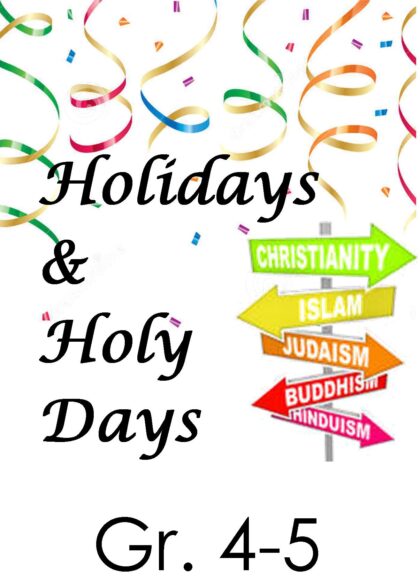Grades 4-5
Holidays & Holy Days
By later elementary school, children are ready to learn more about different religious traditions. This curriculum presents stories and festivities from all of our UU sources:
Direct experience of that transcending mystery and wonder, affirmed in all cultures; Words and deeds of prophetic women and men which challenge us to confront powers and structures of evil with justice, compassion, and the transforming power of love; Wisdom from the world’s religions which inspires us in our ethical and spiritual life; Humanist teachings which counsel us to heed the guidance of reason and the results of science; Spiritual teachings of Earth-centered traditions which celebrate the sacred circle of life and instruct us to live in harmony with the rhythms of nature.
Children are engaged by decorations, colors, costumes, dances, lights, songs, foods, festivity, excitement, pageantry, solemnity, ceremony, and ritual-it is of these that tradition is woven, that memories, beliefs, values, fears, hopes, and reverence are transmitted. A holiday is not something to talk about… it’s something to DO.
First Day: We will get acquainted and talk about our upcoming year, which will help us to feel a kinship to children all over the world, and to identify more closely as a UU.
Water Communion: We celebrate the UU tradition of the water communion.
Rosh Hashana and Yom Kippur: We will celebrate the autumnal Jewish New Year, feeling the joy associated with new beginnings as well as the responsibility to correct old mistakes.
John Murray Day: Meet John Murray, father of American Universalism. In this story a chapel is built to await the coming, someday, of a preacher who will speak of a loving God; just such a preacher sails to America, determined never to preach again…until he meets the builder of the chapel.
Dussehra: We will celebrate this Hindu festival of the triumph of good over evil.
Sukkot: Our class builds a sukkah as we celebrate the biblical thanksgiving festival of the Jewish people.
Indigenous People’s Day: To appreciate Native American religions, their deep spirituality and oneness with nature.
UNICEF Day: For UNICEF Day (United Nation’s International Children’s Emergency Fundraise) we raise awareness of the plight of many of the world’s
people, hold up the goal of international cooperation, and celebrate and support the achievements of UNICEF.
El Dia De Los Muertos (Day of the Dead): We will celebrate the lives of loved ones in our lives that have passed on as we explore this Mexican holiday.
Divali: We will celebrate this fall festival that welcomes the Hindu goddess of good fortune, Lakshmi.
Hogbetsotso: Learn about the Exodus story of the Anlo Ewe people who fled an evil king to safely settle in Ghana.
Dance of the Deer: Introduce religious beliefs of the Huichol through their yarn paintings; to help children express their values through yarn paintings.
Hannukah: The celebration of the Jewish Festival of Lights marks the winning of a victory for religious freedom, and the story of the light that would not go out.
Three KingsDay: Learn about Día de los Reyes and how it is celebrated in Spanish speaking parts of the world
Our New Year: To offer the opportunity for self-assessment—to encourage fresh hopes and good resolutions
Fete du Vodun: Learn about the history of the Vodun religion and how it was brought to the Americas.
Martin Luther King Day: We will honor the birthday of a great American in the struggle for justice and celebrate the power of non-violence.
Imbolc/Candelmas: Learn about the pagan Wheel of the Year and celebrate the coming spring.
Powamu: We celebrate the Hopi Bean Planting Ceremony, awakening our reverence for the gift of life.
Festival of Masks: Learn about some traditional African religious beliefs; explore ideas about God
Mardi Gras: We will introduce the story of Jesus’ life and the Christian world’s observance of Carnival, Ash Wednesday and Lent.
Purim: Introduces the Jewish festival of Purim.
Holi: Introduces the Hindu Festival of Colors.
St. Patrick’s Day: We learn the real story of the patron saint of Ireland and celebrate a bit of Irish culture.
No Ruz: We celebrate the Iranian New Year, and its ritual for casting out quarrels and starting the new year in harmony.
Easter: We share the story of Jesus’ death and rejoice in the renewal of life.
Passover: We celebrate the Jewish festival of freedom, with its symbols, story and songs.
Earth Day: We celebrate the interconnectedness of all life on our planet; to rejoice in its beauty; to accept responsibility for its preservation.
Buddha’s Birthday: We introduce the children to the life of Buddha and his teachings.
Eid al-Adha: This lesson introduces children to two of the most important holidays in Islam. Eid al-Adha and Eid al-Fitr
Mother’s Peace Day: We recognize Julia Ward Howe, a Unitarian pioneer in the cause of peace.
Flower Communion: We share the UU tradition of a Flower Communion and to celebrate the completion of the Holidays and Holy Days year together.
